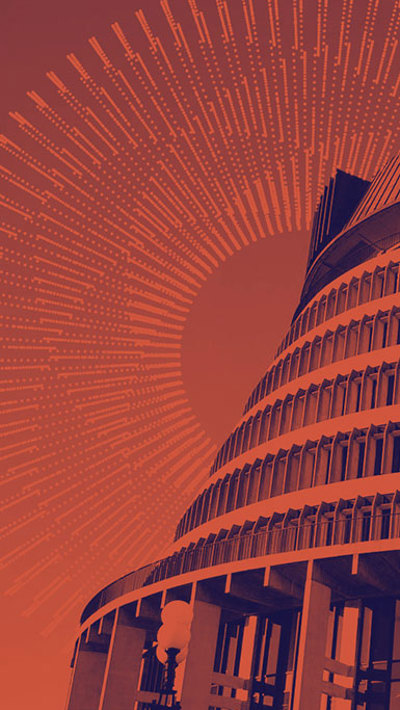Contents
The Government’s immediate response to the economic damage created by COVID-19 – the wage subsidy, the COVID redundancy payment, the cheap (or free) loans to business and the tax relief – were broadly supported by the public and across the political spectrum. But the bigger challenge, as Finance Minister Grant Robertson acknowledged in this year’s Budget speech, was always going to be how to “build back better”.
There is a perception that the pandemic may have created a moment of historic opportunity in New Zealand, and the world. The case for fundamental change has been building over the last ten years as the evidence grows that existing models are not working – increasing and unsustainable social and income inequality, increasing and unsustainable pressure on the natural environment, increasing and unsustainable competition for natural resources within and across borders, and increasing geo-political volatility.
So this election, more than most, we are looking to our politicians for a longer-term perspective of how they will take the country forward into a more sustainable future. We look at the policies on offer to promote economic, environmental and social sustainability.
There is not much fresh thinking on display among the manifesto offerings but it would be unrealistic to expect that at this stage – and dangerous to sit back and rely on the politicians to get it right. Our business leaders, the lead industry organisations, the scientific and academic establishments, iwi and the creative and voluntary sectors will all need to bring their perspectives and learned experience to the rebuild task if we are going to get the best result possible. But this election is a step along the path.
This is the final publication in our 2020 election series. The first two instalments looked at:
- how to get the books back into black, and
- the transition to a lower carbon economy.
We have not attempted to list every policy, just those we regard as most significant, and enough to give you a clear insight into the parties’ different priorities and preferences.
Economy
Broad position statements
| Labour | Greens | National | ACT |
| Labour will “continue to put people at the centre of our economic plan….The economy exists to serve our people, and we’ll make sure it does”. |
The Greens will seek to move “from exploitation of the environment to sustainability, from dependence on commodities to adding value through knowledge and innovation, and from producing more to living better”. |
National will “back the private sector, in particular our small businesses, to create jobs and get the economy moving again”. |
ACT is advocating “a low tax, low debt, high growth strategy led by private enterprise”. |
Promoting innovation
| Labour | Greens | National | ACT |
|
Investigate creating a growth fund, establishing a micro-finance company or expanding the Venture Investment Fund Continue to address unequal access to digital technology in schools |
Increase science funding and simplify the grants process Support low emissions industries, including gaming, wood processing and 3D printing Support local hi-tech suppliers through government procurement |
Government/private sector partnership to invest $600m in tech start-ups $1b in technology infrastructure upgrades Relax regulation on the technology sector |
Repeal the ban on genetic engineering |
Promoting productivity
| Labour | Greens | National | ACT |
|
$42b over four years for infrastructure investment Increased funding to attract overseas investment to New Zealand $100m regional economic policy |
Light rail between Mangere, Auckland Airport and the CBD, between the CBD and Westgate, and across the harbour Expansion in state house build programme to clear the wait list in five years |
Large transport programme, including:
|
Establish an independent infrastructure corporation Allow investors from OECD countries to bypass overseas investment approval |
Promoting skills and employment
| Labour | Greens | National | ACT |
|
Complete the reform of the vocational education sector Maintain fees-free study for the first year at university, re-direct the remaining funding to apprenticeship training Continue the 11,000 environmental jobs scheme |
Students to receive a guaranteed minimum income and a universal student allowance Provide training for new clean energy jobs |
1000 tertiary scholarships for students from low decile schools toward STEM (science, technology, engineering and maths) degrees SkillStart, $4,000 to tertiary training providers for each unemployed person who, after training, holds down a job for at least 90 days |
Each child to get a bank account at age 2 in which the state would put $12,000 a year until age 18 Increase the proportion of funding per apprentice paid to business owners |
Environment
Environmental stewardship
| Labour | Greens | National | ACT |
|
Replace the RMA with two separate laws $50m to develop a modular planning tool to cover all on-property requirements for farmers and growers, including environment, labour, biosecurity and H&S standards Continue 10 year plan to improve the primary sector Continue funding to help farmers transition to sustainable land use practices $750m three waters programme |
Add the right to a sustainable environment to the Bill of Rights Increase funding for predator eradication Focus regional development on environmental and iwi-led activity Support regenerative and organic agriculture Establish a sustainability accreditation scheme for agricultural products Rehabilitate wetlands, riverbanks and estuaries |
Replace the RMA with separate laws for environmental standards and urban planning Review the fresh water regulations Aim to make New Zealand predator free by 2050 Establish two new national parks and work to progress the Kermadec Marine Sanctuary Prepare a new organics bill |
Replace the RMA with a new Urban Development Act Fund research into the development of 1080 alternatives Require councils to commit to water quality objectives and upgrade water infrastructure Reverse agricultural methane and freshwater reforms |
Managing limited resources
| Labour | Greens | National | ACT |
|
Restrict the conversion of productive farmland into forestry Set aside 10% of ocean ecosystems as reserves |
Put at least 30% of New Zealand’s Exclusive Economic Zone under protection by 2030 Review the fisheries quota system, ban set netting and phase out other destructive fishing methods Speed up camera installation on commercial fishing vessels Resource rental on the commercial use of water |
Install cameras on all fishing boats Consider establishing more marine reserves |
Waste and pollution
| Labour | Greens | National | ACT |
|
A range of incentives to encourage the uptake of “clean” vehicles, improve efficiency standards and reduce emissions Phase out single use and hard to recycle plastics by 2025 A range of initiatives to encourage business to transition to lower carbon alternatives |
A range of incentives to encourage the uptake of “clean” vehicles, improve fuel efficiency standards and reduce emissions Develop local recycling capability Reform waste laws and policy with the aim of zero waste Create sector wide product stewardship schemes for problem products |
Exempt electric vehicles from FBT and allow them to use bus lanes | Allow waste to be burned for electricity generation |
Society
Access to opportunity
| Labour | Greens | National | ACT |
|
Replace the decile system with an Equity Index Expand the lunches in schools programme Reinstate Training Incentive Allowance for sole parents and disabled people to do tertiary study Allow people to earn more before benefits abate Expand subsidies for employing people at risk of long-term unemployment $320m over four years for most disadvantaged schools |
Students to receive a guaranteed minimum income of $325 a week and a universal student allowance Establish workforce re-entry programmes for sole parents $9.3b upgrade to public transport infrastructure, with a national ‘Go Anywhere’ card with fares free for under 18s and over 65s and a 50% discount to students and apprentices |
Non-disclosure of child abuse would become an offence B4 School check at age three to identify developmental concerns Parents allocated $3000 per child to spend on a range of needs $630m over four years for more teacher aides and to support children with extra needs 90 day rule |
90 day rule Reduction to, and freeze on minimum wage |
Income support
| Labour | Greens | National | ACT |
|
Progressively extend Living Wage guarantees to low income contractors in the public sector (cleaners, security guards, caterers) Legislate for fair pay agreements |
Establish a minimum income of $325 a week for people not in full time work, $435 for sole parents Replace Working for Families with $190 a week for the first child and $120 for subsequent children |
Employment insurance scheme under which people can claim 55% of weekly average earnings to $60,000 a year |
Health
| Labour | Greens | National | ACT |
|
Mental health services to all primary and intermediate children within five years Expand suicide prevention efforts Expand healthy homes initiative
|
Free mental health counselling to everyone under 25 Levy on sugary drinks Free dental care to students, beneficiaries and superannuitants |
Introduce a national stepped care approach to mental health services Develop a national suicide prevention strategy |
Establish a new entity to fund and commission mental health and addiction services Reduce DHBs from 20 to six |
Housing
| Labour | Greens | National | ACT |
|
Build 8,000 new public and transitional homes Fund insulation and heating in low income homes Limit rent increases to once a year |
Create a Rental Warrant of Fitness to ensure rental properties are warm |
Rent to buy or shared equity scheme for existing tenants to buy their state house Continue building state houses Require councils through emergency legislation to immediately open up land for 30 years of population growth |
Allow councils to use targeted rates to pay for new housing development infrastructure |
Treaty
| Labour | Greens | National | ACT |
|
Matariki a public holiday Integrate te reo Māori into schools and early learning by 2025 Establish a Māori Health Agency |
Make Matariki a public holiday Make te reo Māori and Māori history core curriculum subjects to Year 10 Establish a Māori Health Agency and fund primary healthcare through Maori providers |
Continue to support Māori-medium education and the development of curriculum resources for NZ history Make te reo Māori a “priority” language Improve access to Whānau Ora Maintain funding to Māori media outlets |
Abolish the Māori seats |








































